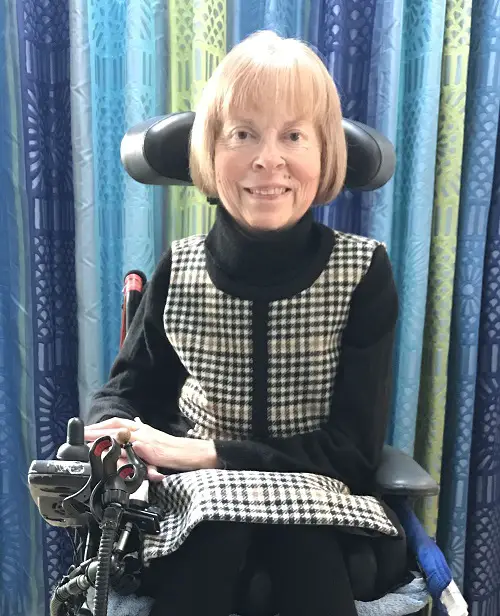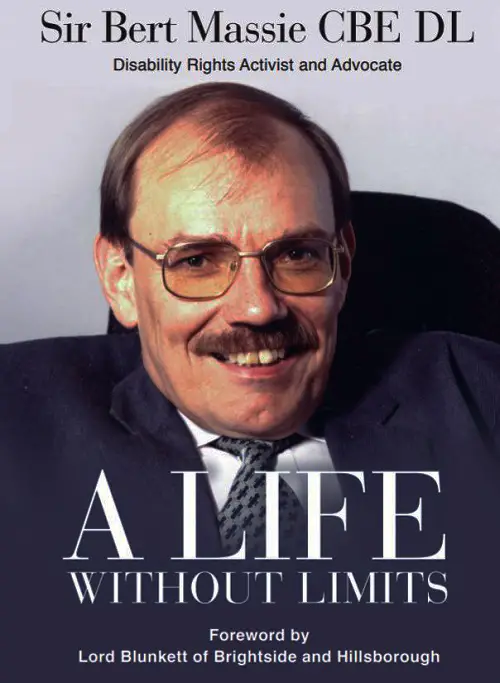
Jane Campbell on Sir Bert Massie and disability rights today
Sir Bert Massie CBE was an influential disability rights activist that dedicated his life to creating change for disabled people. This year, following his death in 2017, his wife and friends have released his memoirs, A Life Without Limits: Disability Rights Activist and Advocate, written largely by Bert.
Jane Campell, another prominent figure fighting for inclusion, worked alongside Bert for many years. So, we sent our writer, Fleur Perry, to speak to Jane to understand more about what Bert was really like, how his legacy lives on and the landscape of disability rights today.
Bert Massie starting campaigning for disabled people’s rights as a teenager, after battling through the education system to obtain a Bachelor of Arts and to qualify as a social worker. He became severely disabled after contracting polio as a baby.
He quickly became a prominent figure in the fight for fair treatment for disabled people leading to the groundbreaking Disability Discrimination Act. He went on to serve as Chairman of the Disability Rights Commission and became a founding commissioner of the subsequent Equality and Human Rights Commission.
His extraordinary achievements were recognised by the award of an OBE, then a CBE and finally, in 2007, a knighthood. In October 2017, Bert passed away at the age of 70.
Here, Jane Campbell recounts her experiences of meeting and working with Bert, and how there is still much work to be done today to improve the lives of disabled people.


Please tell Disability Horizons readers about yourself?
I’m a crossbench peer in the House of Lords and have been a disability rights activist for most of my adult life. I have a particular interest in campaigning to further the rights of all disabled people to live independently.
Sir Bert Massie mentions meeting you at Hereward College. What were your first impressions of him?
He was just leaving the college as I joined, but I remember him showing the new intake of students around and answering their questions, normally with one of his terrible jokes!
He was obviously intelligent. But what struck me most was how brimming with confidence he was. I remember thinking, “He’s not like the disabled young people in my school.” I wondered whether I might have felt that sure of myself at his age.
When you worked with Sir Bert Massie years later, what was he like?
We didn’t always agree! But one of the great things about Bert was his willingness to listen to other points of view. He always tried to find common ground everyone could work with.
His ability to make compromises whilst negotiating for change was a skill indeed. It had the potential to be to his detriment – as exemplified during the ‘cold war’ between organisations run and controlled by disabled activists and his own charity RADAR, which wasn’t.
Having said that, no one could deny his deep commitment to improving the quality of life of disabled people. That principle meant he was constantly burning the midnight oil, working towards better rights for us all.


The campaigning of the early 90s led to the first anti-discrimination legislation, the Disability Discrimination Act 1995. Do we still have the skills to make change happen at that level? What would be top of your wish list right now?
I think it has become harder. Currently, disabled people do not have a single big piece of legislation to come together around. There are plenty of smaller campaigns, such as access to trains and planes or various financial entitlements. But there is nothing overarching like we had in the 80s and 90s with the Disability Discrimination Act or Direct Payments to live independently.
There is so much political focus is on Brexit, it’s draining the oxygen out of everything else. I am surprised that disabled people have not been more active in this arena, especially considering the fact that leaving the EU has wide-ranging implications for disabled people for years to come.
It worries me that we as disabled people are not very visible in mainstream politics at the moment. This is certainly echoed by Bert in his book, where he suggests that in, “Some areas, we’re going backwards in terms of our rights.”
So keeping hold of what we have is really important to me. For instance, I am working on a number of proposals to secure our right to independent living, which I hope will be enshrined in law.
Currently, the policies and practices that enabled disabled people to live independently are eroding. Many are struggling to get even basic needs met. Without a statutory entitlement, rights are not worth the paper they are written on.
We also desperately need to encourage more disabled people and their allies to come together to demonstrate. We are the authentic voice of disability, not professionals or charities who speak on our behalf. Our voice is louder if we work together.
The slogan ‘nothing about us, without us’ is as important now as it was when we came together and fought for our civil rights in the 80s.
Our co-founder Martyn Sibley recently interviewed another of Bert’s friends and colleagues, Phil Friend, who is also an eminent disability rights campaigner. Visit Martyn Sibley’s blog to watch the video interview or listen to the podcast.
By Fleur Perry
You can buy Bert’s memoirs, A Life Without Limits: Disability Rights Activist and Advocate, on Amazon.
More on Disability Horizons…